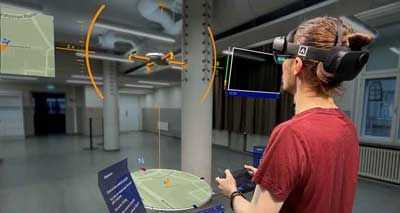
The Role of Simulators in Airplane Pilot Training and Their Future in Drone Training
Flight simulators have revolutionized the way pilots are trained, offering a safe, cost-effective, and highly realistic environment for learning and practicing essential flying skills.

These advanced tools replicate real-world flying conditions, allowing pilots to hone their abilities without the risks associated with actual flight.
One of the most significant advantages of flight simulators is the ability to practice emergency procedures and unusual flight scenarios in a controlled environment. This safety net allows pilots to make mistakes and learn from them without any real-world consequences. For instance, pilots can practice engine failures, severe turbulence, and emergency landings, ensuring they are well-prepared for any situation they might encounter in the air.
Cost-Effectiveness
Operating a real aircraft is expensive, with costs related to fuel, maintenance, and insurance. Simulators provide a cost-effective alternative, enabling students to log flight hours and practice essential skills without incurring these high costs. This affordability makes pilot training more accessible to a broader range of students.
Flight simulators are equipped with advanced technology that replicates real-world flying conditions, helping students develop critical skills such as instrument reading, navigation, and handling various weather conditions1. Studies have shown that pilots who use home flight simulation earn their private pilot certificates with almost 20 hours less than the FAA average.
Simulators allow for more efficient training schedules. Pilots can practice specific maneuvers repeatedly without the need for lengthy pre-flight preparations or dealing with air traffic. This efficiency translates into significant time savings, enabling faster progression through training programs.
The Future of Simulators in Drone Pilot Training
As drone technology continues to advance, the need for skilled drone pilots is growing. Virtual reality (VR) based simulators offer a promising solution for training drone pilots, providing an immersive and cost-effective training environment.
VR-based simulators can be significantly less expensive than traditional flight simulators, making them accessible to a wider audience. This affordability is crucial for hobbyists, small businesses, and educational institutions looking to incorporate drone training into their programs.
VR technology can create highly realistic training scenarios, allowing drone pilots to practice in various environments and conditions. This includes urban areas, forests, and industrial sites, which are often challenging to replicate in real life. By training in these simulated environments, drone pilots can develop the skills needed to navigate complex and potentially hazardous situations.
The immersive nature of VR can enhance the learning experience by providing a more engaging and interactive training environment. Pilots can receive immediate feedback on their performance, helping them to quickly identify and correct mistakes. This interactive approach can accelerate the learning process and improve skill retention.
As VR technology continues to evolve, there is potential for developing advanced training programs that incorporate artificial intelligence (AI) and machine learning. These programs could adapt to the individual needs of each pilot, providing personalized training experiences that target specific areas for improvement3.
Summary
The use of simulators in pilot training has proven to be a game-changer, offering numerous benefits in terms of safety, cost, and efficiency. As we look to the future, the potential for VR-based simulators in drone pilot training is immense. By leveraging this technology, we can create accessible, realistic, and effective training programs that prepare drone pilots for the challenges of the real world.
What are your thoughts on the future of drone training with VR simulators? Do you think it will become as integral as traditional flight simulators are for airplane pilots? At AirSkill, we do.

Sakari Salli
CEO
Sakari is the CEO of Anarky Labs, the company behind AirSkill and a pioneer in developing situational awareness software for drone operations. As CEO, Sakari leads the sales strategy and actions to make Anarky's products a leader in the field of situational awareness and training for professional drone pilots.